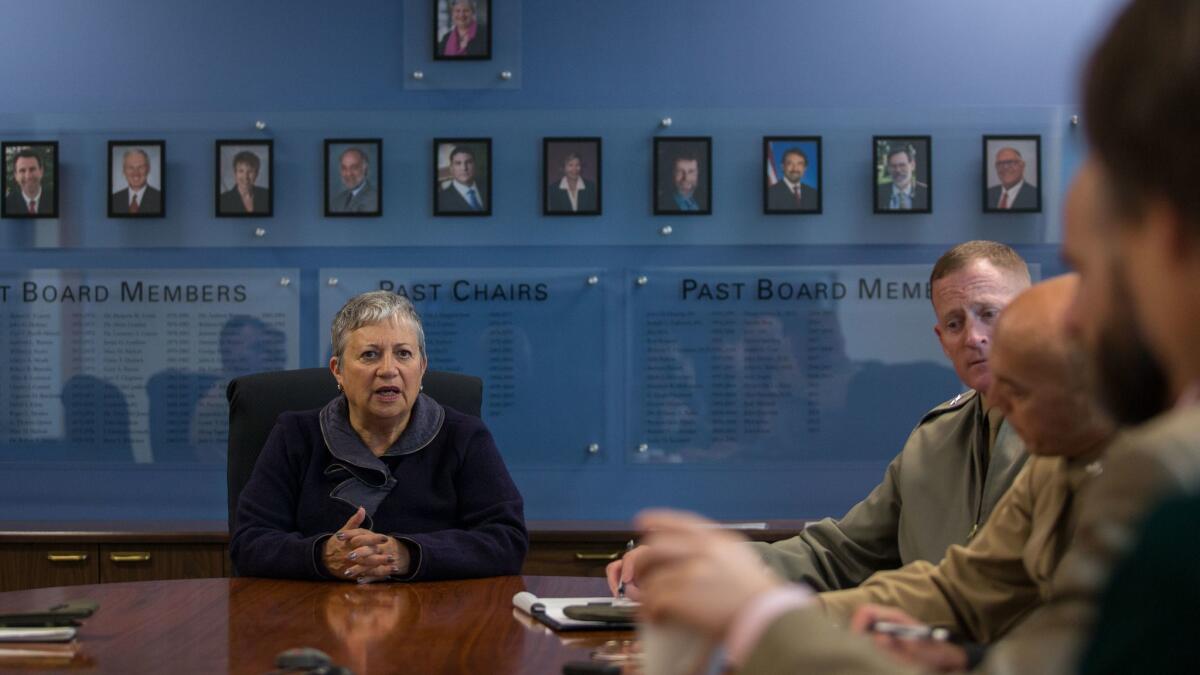The future of California’s cap-and-trade program remains uncertain as it gets its day in court

- Share via
Reporting from Sacramento — Lawyers for the state and businesses clashed in a Sacramento appeals court Tuesday over how much power California has to regulate greenhouse gas emissions and whether that authority includes raising revenue for lawmakers to spend.
The case could determine the future of the state’s cap-and-trade program, which requires companies to buy permits to release greenhouse gases into the atmosphere. The program is the centerpiece of California’s climate agenda and has been extolled as an international model in the fight against global warming, but opponents argue that it constitutes an unconstitutional tax.
A decision, which is expected from the state appeals court judges within three months, has been hotly anticipated by businesses and advocates whose next steps hinge on which way the court rules. Spectators and journalists began lining up outside the courthouse before it opened on Tuesday morning, and there weren’t enough seats in the courtroom for everyone to watch the proceedings.
National environmental organizations have vociferously defended the cap-and-trade program, one of the few such initiatives anywhere in the world. The groups are particularly concerned about any stumbling block in California with President Trump promising to roll back environmental regulations in Washington.
“With the federal government seemingly stepping back from climate leadership, California’s example is even more important,” said Erica Morehouse, a lawyer for the Environmental Defense Fund.
Cap and trade was devised by the California Air Resources Board to meet emissions-reduction goals set by lawmakers in 2006, and the first permits were auctioned off in 2012. However, the original legislation wasn’t passed with a two-thirds vote, the legal threshold for raising tax revenue.
The state should not be allowed to collect money through the program, said James Parrinello, the attorney representing the California Chamber of Commerce, one of the organizations suing the state.
The Air Resources Board is asking for a “blank check” granting “the power to raise whatever revenue it wants,” Parrinello said. He added that he believes that because greenhouse gas emissions are the inevitable result of modern society, regulators could start charging Californians for how far they drive to limit tailpipe emissions, or how much milk they drink because cows produce methane.
“All human activity creates greenhouse gases,” he said. “[Regulators] could say those activities are privileges and levy a fee on them.”
Parrinello said the revenue produced by cap and trade — now in the billions of dollars since the first auction in 2012 — is “essentially a government slush fund.” Some of the money is used to fund the construction of the bullet train from Los Angeles to San Francisco.
Follow live coverage from the Capitol on Essential Politics »
David Zonana, a deputy attorney general representing the Air Resources Board, defended the revenue by saying it’s being used to reduce greenhouse gas emissions, furthering the goal of the regulations. For example, spending cap-and-trade revenue on affordable housing developments helps slash emissions if it’s close to transit lines, reducing the amount of time people drive, he said.
Zonana said cap and trade is a “legitimate regulatory tool.”
“Greenhouse gases are an enormous environmental problem,” he said. “Cap and trade is tested and well-suited to that problem.”
The court should not “second guess” the decision of regulators, Zonana added.
Zonana also said cap and trade isn’t a tax because buying pollution permits through a state auction isn’t required under the 2006 emissions-reduction law. Companies could also trade for the credits on a market, or modify their operations to lower emissions.
But that’s not how the system works in practice, Parrinello said. Companies often have no other choice besides buying permits unless they want to shut down.
“An income tax is voluntary because people can quit their jobs,” he said.
Attorneys were reluctant to predict which way the court will rule once a decision is released in the coming weeks or months.
“You can’t handicap what the decision is,” said Tony Francois, a lawyer for the conservative Pacific Legal Foundation, which is representing some of the businesses challenging the program.
Twitter: @chrismegerian
ALSO
The immediate threat to California’s climate-change fight isn’t Trump, it’s this
California’s cap-and-trade program faces daunting hurdles to avoid collapse
Updates on California politics
More to Read
Get the L.A. Times Politics newsletter
Deeply reported insights into legislation, politics and policy from Sacramento, Washington and beyond. In your inbox three times per week.
You may occasionally receive promotional content from the Los Angeles Times.











